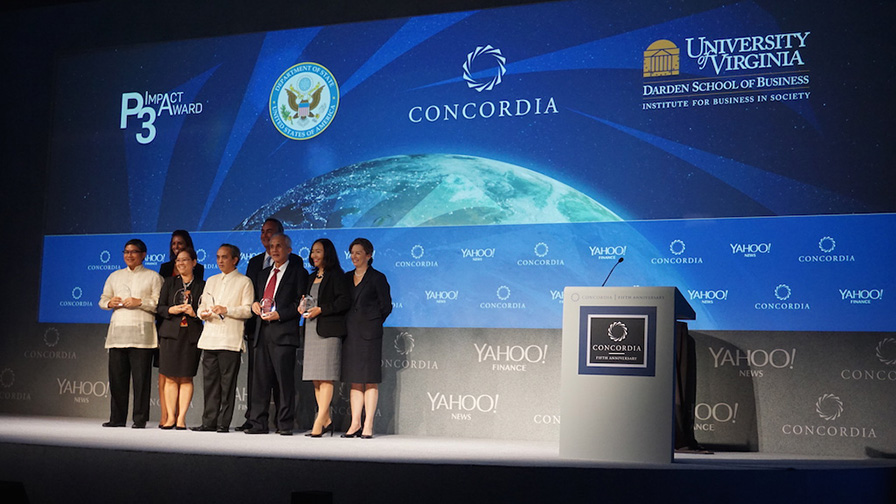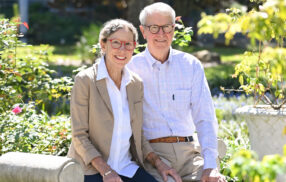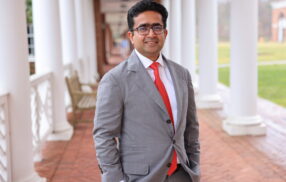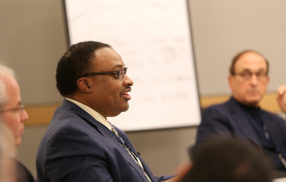
Blending Business and Policy: Darden Programs Spur Multisector Collaboration
By Dave Hendrick
Annie Medaglia (MBA ’15) came to the University of Virginia Darden School of Business from the world of public policy with the goal of returning to the sector after earning an MBA, but with a deeper understanding of the private sector and the ability to lead by building bridges between sectors.
“I wanted a different way of thinking about how to solve various social and policy challenges,” said Medaglia, who worked for the U.S. Department of State in various capacities prior to Darden. “I knew how important the private sector was to economic development and to larger public policies. The public and private sectors are indispensable to one another, but not a lot of people understand how both sectors work.”
At Darden, Medaglia discovered like-minded professors and students working to advance multisector collaboration and pitched the idea of the Tri-Sector Leadership (TSL) Fellows Program, a cross-University effort to explore public, private and social sector issues in more depth. Darden’s Institute for Business in Society developed and manages the TSL Fellows program, which brings a group of students selected from Darden, the Batten School of Public Policy and the UVA School of Law together to interact with leaders from public, private and social sectors.
“I was really excited to see the TSL Fellows happen,” said Medaglia, who now serves as deputy director of the Global Energy Center at the Atlantic Council. “Darden is just a great environment for supporting people who come up with ideas.”
Walking in Someone Else’s Shoes
The best solutions to complex challenges are often only possible through multisector collaboration, but old barriers between sectors can often prevent those solutions from being realized.
For Professor Mary Margaret Frank, who serves as a faculty representative for the TSL Fellows and an academic director at the Institute for Business in Society, programs such as the TSL Fellows represent important first steps to break down silos and encourage understanding and collaboration across sectors.
“As a leader, being able to walk in someone else’s shoes is really valuable. Understanding your own incentives and being aware of your own situation is important, but it’s also critical to be aware of someone else’s — whether it’s someone within your own organization or an individual in another sector,” said Frank, a tax expert who previously taught a cross-University course on the National Debt. “And being able to view situations from these multiple perspectives can be much harder when you’re just starting out.”
Entering its third year, the TSL program has proven to be an immediate hit with students, garnering far more interest than available spaces. Applications for the third-year cohort increased more than 40 percent from the two prior years.
Frank believes the area of multisector collaboration may be of growing interest at Darden because students know they will do business in a globalized world with countries facing more constrained resources.
Public-private partnerships beyond traditional areas like infrastructure into services such as education, technology and health care have emerged due to the demand for innovative thinking to facilitate economic development in emerging markets.
Beyond Grounds, Darden plays a key role in fostering multisector collaboration globally by partnering with the U.S. Department of State and Concordia to present the P3 Impact Award, an international award that honors a leading public-private partnership focused on social impact.
Such collaboration resonates at large Fortune 500 companies, with companies such as Microsoft and Hershey participating in previous winning partnerships.
Opportunities on Grounds
At Darden, the opportunities abound for students interested in cultivating a collaborative approach to solving large societal issues. New electives on topics such as the economics of water, transforming society through markets, and impact investing recognize the growing intersection of multiple sectors in the global economy.
Stuart Cameron (MBA ’16), president of the Business and Public Policy Club last academic year, said the club serves as a way for students to explore an interest in public policy and understand how policy can both shape and be shaped by the private sector, in part by tapping into those already working in the space.
“Darden has alumni either serving in government or in broader policy roles, and we like to take advantage of that at the club to try to boost the knowledge of potential career paths,” said Cameron.
Cameron came to Darden from Public Financial Management, a private firm catering to the financial needs of public institutions, and is starting work in the public pensions group of Cambridge Associates after graduation, addressing a topic he calls “a crucial issue facing state and local governments in the next decade.”
Professor Alan Beckenstein‘s “Business-Government Relations” course helped “solidify the foundation” that he had in the area, Cameron said, noting that he also gained public policy lessons from across the curriculum, even from more entrepreneurial-focused classes on venture capital and private equity, as well as from a Global Business Experience in Sweden.
“One of the things we do that might be different than our peers is we talk a lot about the different stakeholders of an organization, project or market,” Frank said. “Darden’s required First Year ethics program, for instance, is going to force you to think about the decisions you make and their impact on a variety of stakeholders. I take that same perspective in both of my Second Year electives that focus on the impact of taxes on business decisions and deal structure.”
Anna Payne Fife (MBA ’14), who like Medaglia came to Darden from Capitol Hill with the intention of returning to the world of policy in some fashion, said learning to holistically consider how the pieces of an organization work was an unanticipated benefit of attending a business school like Darden.
“For people on the Hill who have been in these high-pressure offices where there is a lot of change and you’re dealing with complex legislation, having the suite of skills that you get with an MBA can really help you understand process and learn how people fit together,” Fife said. “That’s really valuable.”
Fife, one of two Darden grads who now works with the D.C.-based child hunger advocacy group Share Our Strength, said she left Darden with a much broader skill set, able to play key roles in strategy and project management.
“There are organizations that really value what an MBA has to bring, and Darden’s broad approach really fits Share Our Strength and others like it,” said Fife, who also worked to get the TSL program off the ground.
Building a Pillar of Business and Policy Thought Leadership
With the School making more deliberate moves into the Washington, D.C., area, those involved in reaching across sectors say the opportunities are significant for Darden.
“Darden has been developing efforts on a number of fronts in the past several years where we are considering intersections between business and policy, so increased engagement in the D.C. area will enhance Darden’s thought leadership in the space,” said Lisa Stewart, director of the Institute for Business in Society.
Frank says she believes many of Darden’s research Centers of Excellence will benefit from the foundation set by having the broader Darden enterprise in the region. Faculty who have interests in the area will find expanded avenues of collaboration — from experiential learning to case writing — and students will benefit from the exposure to so many practitioners.
Spearheading the effort to make sure Darden’s expanded presence in the D.C. area translates into emerging opportunities for the School’s research centers, faculty and students will be Professor Greg Fairchild, recently named associate dean for Washington, D.C., area initiatives and academic director of public policy and entrepreneurship.
Medaglia is among those who believe expanded activity will prove to be both smart and fruitful for the School.
“It’s such an incredible School, and it’s so close to the nation’s capital,” Medaglia said. “Why not use D.C. more?”
Interested in multisector collaboration at Darden? Contact Institute for Business in Society Associate Director Maggie Morse to learn more.
The University of Virginia Darden School of Business prepares responsible global leaders through unparalleled transformational learning experiences. Darden’s graduate degree programs (MBA, MSBA and Ph.D.) and Executive Education & Lifelong Learning programs offered by the Darden School Foundation set the stage for a lifetime of career advancement and impact. Darden’s top-ranked faculty, renowned for teaching excellence, inspires and shapes modern business leadership worldwide through research, thought leadership and business publishing. Darden has Grounds in Charlottesville, Virginia, and the Washington, D.C., area and a global community that includes 18,000 alumni in 90 countries. Darden was established in 1955 at the University of Virginia, a top public university founded by Thomas Jefferson in 1819 in Charlottesville, Virginia.
Press Contact
Molly Mitchell
Associate Director of Content Marketing and Social Media
Darden School of Business
University of Virginia
MitchellM@darden.virginia.edu







